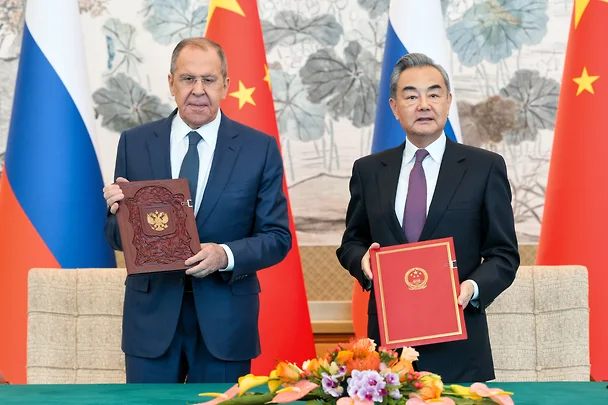
Xi reiterated China's commitment to its partnership with Russia in his meeting with Lavrov.
During a meeting in Beijing, Chinese President Xi Jinping and Russian Foreign Minister Sergei Lavrov condemned the 'bloc confrontation' led by the West. The South China Morning Post reported that President Xi expressed China's desire to enhance strategic coordination with Russia within a multilateral framework to reform the global system.
“China has always prioritised the development of Sino-Russian relations,” according to Xi Jinping as quoted by China Central Television (CCTV). “We aim to collaborate with Russia to enhance bilateral ties and strengthen multilateral strategic coordination in BRICS and the Shanghai Cooperation Organization (SCO). Our goal is to demonstrate greater responsibility in uniting the countries of the Global South and to advance the reform of the global governance system.”
The Russian Foreign Minister Lavrov visited China for two days to prepare for the upcoming meeting between the leaders of the two countries. During the visit, Lavrov conveyed greetings from the Russian president and expressed gratitude to Xi Jinping for congratulating him on his victory in the March presidential elections.
Sergei Lavrov emphasized that Russian-Chinese relations demonstrate stability and the ability to adapt to any conditions, even the most difficult ones, thanks to the diplomacy of the leaders. The basis of these relations is mutual support on issues affecting the fundamental interests of both countries.
Russia's top diplomat confirmed that Vladimir Putin and Xi Jinping will meet at the SCO and BRICS summits in Astana and Kazan, respectively. Vladimir Putin's visit to Beijing is reportedly scheduled to take place in May, after his inauguration, to celebrate the 75th anniversary of diplomatic relations between Russia and China. However, Dmitry Peskov, the press secretary of the Russian president, stated that he could not yet confirm the date of the visit.
Lavrov's visit to China occurred as Moscow and Beijing strengthened ties with the Global South to counter the Western-led world order. The United States, which is increasing its activity in the Asia-Pacific region (APR), closely monitors the actions of Moscow and Beijing. This week, the leaders of Japan and the Philippines will fly to Washington for a trilateral summit. Furthermore, the United States, United Kingdom, and Australia are planning to collaborate with Japan under the trilateral security agreement known as AUKUS.
During a joint press conference, Chinese Foreign Minister and Head of the Office of the CPC Central Committee Foreign Affairs Commission, Wang Yi, urged the United States and its allies to refrain from interfering in the Asia-Pacific region. Wang Yi also expressed concern about NATO's plans to expand its presence in the Far East and the Pacific Ocean, beyond its traditional focus on Europe.
Sergei Lavrov criticised the West for imposing illegal sanctions and forming military and political alliances aimed at Russia and China. He believes that these actions are intended to undermine the multipolar world order. Lavrov also affirmed that Russia and China will work together to resist these attempts.
Wang and Lavrov emphasised that China and Russia will collaborate to defend multipolarity, opposing hegemony, power politics, and monopoly in international affairs.
The head of the Russian Foreign Ministry spoke about the unprecedentedly high level of relations between Russia and China, promising to strengthen cooperation in BRICS and the SCO. He also highlighted that they would consider resolving issues related to Western sanctions.
